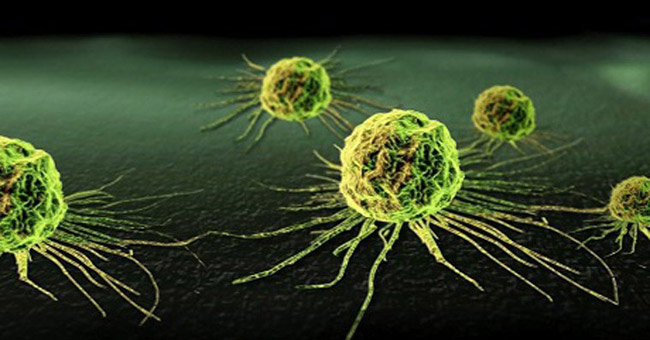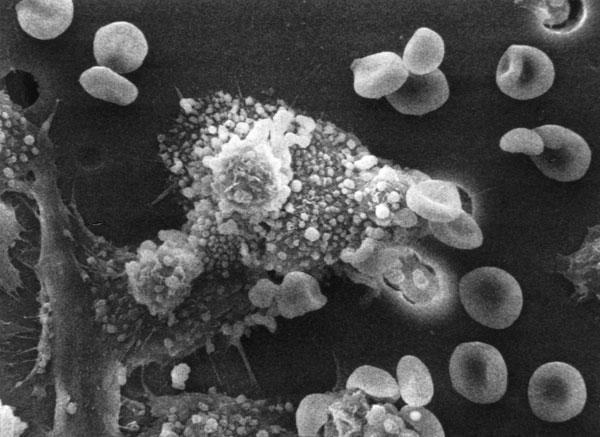Cancer can be transferred from people?
Is cancer contagious?
Can cancer spread from person to person? This is probably a common question for many people.
Cancer cells can be spread from person to person through blood contact, such as blood donation or sharing needles, even from mother to fetus.

Illustration of cancer cells.
However, these are only rare cases, very rarely happened, Dr. Ashley Ng is from the Department of Cancer and Hematology - Research Institute of Walter and Eliza Hall (Australia) answers questions of many people.
'Scientists have previously conducted a fairly large-scale study of about 12,000 patients receiving blood from donors with clinical manifestations of cancer. Results showed no significant increase in risk was noted , 'Ashley said.
This evidence is consistent with what we know about how the immune system's response to the penetration of factors outside the body. In the case of blood transfusions, usually, blood type (A, B, AB and O) between donor and recipient when combined together will make the recipient's immune system unable to distinguish red blood cells from outside. to enter. If there are cancer cells in the blood of a donor, it will inadvertently become a sign that the immune system recognizes the ' strange object' and destroys them before they can integrate.

Human-to-human transmission of cancer is 'very unlikely'.
However, this mechanism will be ineffective when the recipient immune system is not performing well, for example, inhibited by illness or impaired by previous organ transplantation, but the risk is extremely low. - about 0.015%, according to experts.
"When transfusing blood to immunocompromised people, we can treat units of red blood cells by radiation," said Dr. Ng. to speak. " This is done to reduce the risk of white blood cells attacking the recipient's body. Radiation can also kill clinical cancer cells in the donor's blood."
Similarly, the risk of cancer transmission from mother to fetus is also very rare. 'In the 2003 report, only 14 cases of fetus developed cancer due to maternal effects, including leukocytes, malignant tumors, some types of organ cancer such as lung and tumors'.
This infection can be caused by abnormalities that exist during pregnancy, when the fetus' immune system is still not fully developed to withstand the factors coming from outside the body. However, this process is also very difficult because it requires cancer cells to not only move throughout the mother's circulatory system but also to cross the solid ' barrier ' of the placenta. Normally, unless the placenta has a problem such as an accidental injury, the majority of the fetal circulatory system works separately from the mother's blood supply.
However, experts still make recommendations including extremely low rates of infection but not without and therefore, we should still keep in mind to avoid falling into those few cases.
- The most common cancers are in their 20s
- Cancer will increase strongly in Vietnam in the next 5 years
- Dangerous cancer - cause and prevention
- Cancer: 'Pandemic' terrifies men
- Why are more and more young Vietnamese suffering from cancer?
- New research reveals that taller people are more likely to get cancer
- All you need to know about cancer screening
- Why does cancer attack kill humans?
- Decoding why more and more people have cancer
- Four truths are still misunderstood about the cause of cancer
- Why do healthy people still have cancer?
- New research to upgrade chemotherapy, prevent drug-resistant cancer
 Green tea cleans teeth better than mouthwash?
Green tea cleans teeth better than mouthwash? Death kiss: This is why you should not let anyone kiss your baby's lips
Death kiss: This is why you should not let anyone kiss your baby's lips What is salmonellosis?
What is salmonellosis? Caution should be exercised when using aloe vera through eating and drinking
Caution should be exercised when using aloe vera through eating and drinking